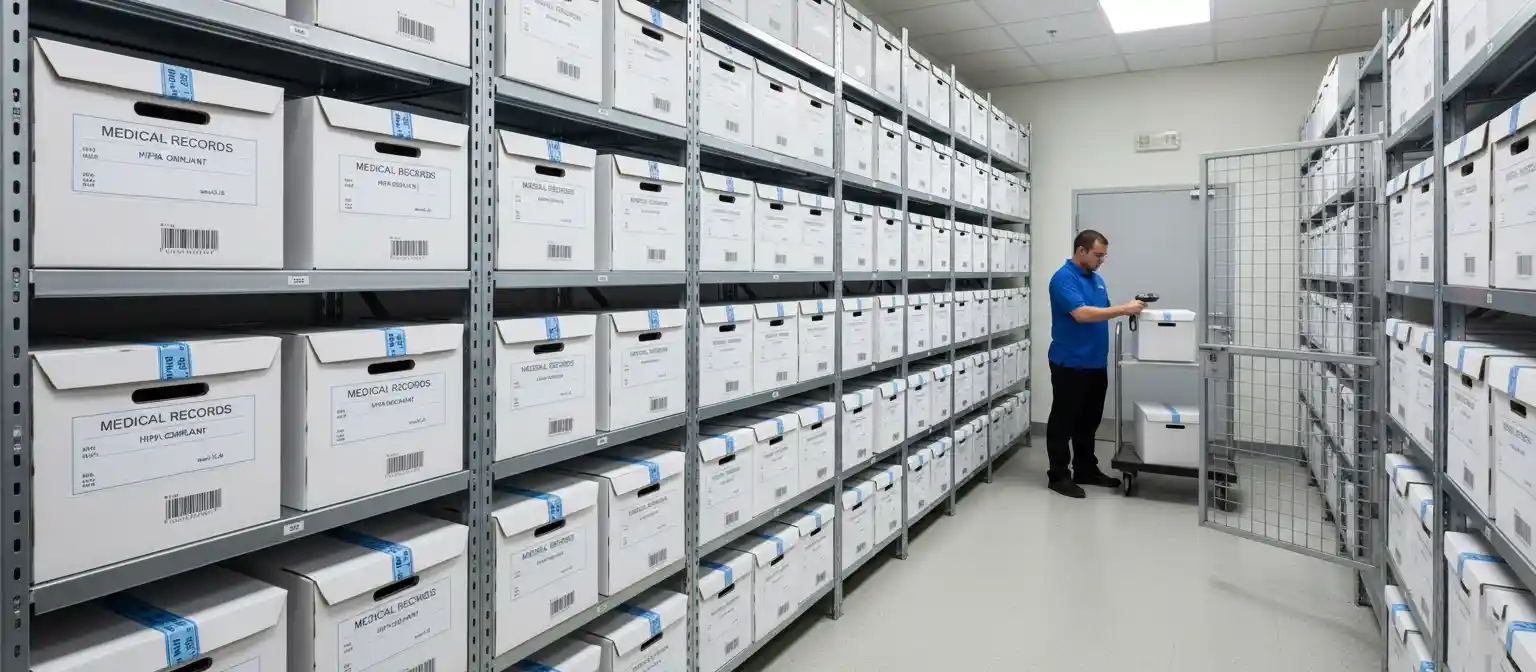E.E. Ward Moving & Storage
The legal blind spot in your medical office move: A guide to true HIPAA compliance

True HIPAA compliance during a commercial move for a healthcare facility extends beyond simple assurances and checklists. It legally requires elevating your moving company to the status of a "Business Associate" through a formal Business Associate Agreement (BAA), which binds them to federal privacy and security regulations and integrates them into a documented chain-of-custody for all Protected Health Information (PHI), both physical and digital.
The dangerous myth of the 'HIPAA-compliant' mover
When planning a medical office relocation, the focus is often on logistics: scheduling, packing equipment, and minimizing downtime. However, the most critical cargo—your patient records—presents a significant legal risk if mishandled. Many commercial movers might claim they are a "HIPAA compliant moving company," but this phrase can be dangerously misleading. Without a formal, legally binding agreement, such a claim is merely a marketing slogan that leaves your practice, clinic, or hospital entirely exposed.
The Health Insurance Portability and Accountability Act (HIPAA) is clear: any vendor that creates, receives, maintains, or transmits Protected Health Information (PHI) on behalf of a covered entity (your practice) is considered a Business Associate. This means when a moving company takes possession of your file boxes, server racks, or backup tapes, they are, by definition, handling PHI. The central question then becomes, are movers considered business associates under HIPAA? If they transport records, the answer is an unequivocal yes. Simply hiring a standard moving company to move PHI without the proper legal framework in place is a compliance failure, and the responsibility for that failure remains squarely on your shoulders as the covered entity.

Your legal shield: The Business Associate Agreement (BAA)
The single most important document in your medical records relocation project plan is the Business Associate Agreement (BAA). This is not just another piece of paperwork; it is a legally enforceable contract that extends your HIPAA compliance obligations to your moving partner. It's the primary mechanism for vendor management for HIPAA compliant moving and your principle legal shield against liability.
When a professional in commercial moving for medical clinics signs a BAA, they are no longer just a vendor; they are a partner in protecting patient privacy. This agreement formally outlines their responsibilities under HIPAA. The specific obligations a mover accepts are extensive and include:
- Breach Notification: The mover is legally required to report any potential breach of PHI (e.g., a lost box, a stolen hard drive) to you without unreasonable delay, allowing you to fulfill your own notification duties.
- Employee Training and Safeguards: The company attests that its employees have undergone HIPAA training and that it will implement the necessary physical safeguards for moving patient files. This includes policies for moving patient information securely.
- Subcontractor Liability: The BAA ensures that the mover is responsible for ensuring any subcontractors they use also comply with HIPAA, extending the chain of compliance.
- Security and Auditing: The mover agrees to implement security measures to protect electronic PHI (ePHI) and to make their policies and records available to the U.S. Department of Health and Human Services (HHS) for auditing purposes.
This framework was solidified when the HHS published its final omnibus rule, which clarified these responsibilities, in the Federal Register on January 25, 2013 according to the official document. Ignoring this BAA requirement means you could be subject to severe penalties for HIPAA violations during a move, which can range from thousands to millions of dollars.
Establishing an unbroken chain of custody for all PHI
A BAA is the legal foundation, but the practical execution of a compliant move relies on an unbroken chain of custody. This is a formal, documented process that tracks all PHI from the moment it leaves your control to the moment it is secured in your new office. Knowing how to ensure chain of custody for patient records is a non-negotiable step.
Beyond Paper Files: Protecting Physical and Digital Records
The process must be comprehensive, covering every format in which you store patient information.
- Physical Records (Charts, Files, X-Rays): This involves a detailed inventory of all containers. Each box or crate should be sequentially numbered, sealed with tamper-evident tape, and logged. Your secure document handling for medical movers should include protocols where a manifest is signed by your representative and the moving supervisor at the origin and cross-checked and signed again upon delivery at the destination. The use of secure, locked bins for moving medical records or HIPAA compliant crating and transport is a best practice.
- Electronic PHI (ePHI): Managing PHI during a business relocation increasingly means protecting data. The risks of migrating electronic PHI are often underestimated. This includes servers, network-attached storage (NAS) devices, backup tapes, and individual hard drives. A HIPAA audit trail for moving records must account for this hardware. The mover must use anti-static padding, secure crating, and climate-controlled, air-ride suspension vehicles to prevent physical damage that could compromise data integrity. Protecting ePHI on servers during a move is a critical task for any medical equipment and data moving services.
Conducting your pre-move risk assessment
Before the first box is packed, you must conduct a risk assessment for moving patient data. This is a practical step to identify and mitigate potential vulnerabilities in your moving plan. This assessment forms the basis of your clinic relocation data protection plan. When vetting movers for HIPAA compliance, walk through the entire process with them and ask pointed questions.
Key areas to assess include:
- Physical Security of the Path: Are there unsecured loading docks, public hallways, or shared elevators where containers of PHI could be left unattended? What is the plan to maintain constant supervision?
- Vehicle and Transport Security: Are the moving trucks lockable and will they be kept locked at all times? Do they have alarm systems or GPS tracking? Are the drivers background-checked? Secure transportation of protected health information is paramount.
- Contingency Planning: What happens if a truck breaks down or is involved in an accident? A professional medical records moving service will have clear protocols for securing the vehicle and its contents and executing a recovery plan.
- End-of-Life Data Management: Does your move involve decommissioning old hardware? Your plan should include secure e-waste disposal for medical offices and HIPAA compliant document destruction services, like secure shredding services after a medical office move, for any records you are not keeping.
Standard movers vs. business associates: a direct comparison
Choosing the right partner for your healthcare relocation and data security involves understanding the profound differences between a standard mover and one who operates as a true Business Associate.
Standard Commercial Moving Services
Pros:
- May have a lower perceived upfront cost.
- Widely available and easy to book for general office furniture and equipment.
Cons:
- Will not sign a BAA, leaving all HIPAA liability with your practice.
- Lacks a formal, documented process for chain of custody for medical documents.
- Personnel have no verifiable HIPAA training on the secure handling of PHI.
- Standard liability insurance does not cover fines or costs associated with a data breach.
HIPAA-Compliant Moving Services with Business Associate Status
Pros:
- Signs a BAA, contractually accepting specific HIPAA liabilities and responsibilities.
- Implements and documents a secure chain of custody for all physical and electronic records.
- Provides a team with specific training on patient information privacy during a move.
- Carries insurance policies designed to cover the unique risks and potential penalties of a PHI breach.
Cons:
- May represent a higher initial investment due to specialized services, training, and insurance requirements.
- Requires more in-depth vetting to confirm their processes and compliance claims.
Answering your key questions about moving medical records
Navigating the regulations for a compliant move can be confusing. Here are answers to some common questions.
How does transferring medical records work during a physical move?
When you are moving your own practice, the transfer involves a meticulous, documented process. It starts with vetting and engaging commercial movers specializing in healthcare who will sign a BAA. You then work with them to create an inventory and a chain-of-custody plan. Records are packed in secure, sealed containers, transported in a secure vehicle, and checked in at the new location to ensure everything is accounted for.
What is required before releasing a patient's medical information when they relocate?
This is an important distinction. The process described in this article is for moving your practice's entire set of records to a new location. When an individual patient relocates and requests their records be sent to a new physician, you must obtain a signed, written authorization from the patient or their legal representative that specifies what information is to be released and to whom. This is a separate process from a bulk office move.
What are the HIPAA rules for sending medical records?
The HIPAA Privacy Rule requires covered entities to have "appropriate administrative, technical, and physical safeguards to protect the privacy of protected health information." When sending records—whether by mail, courier, or a moving company—you must take reasonable steps to ensure their security and confidentiality. For a large-scale move, these "reasonable steps" absolutely include a BAA and a secure, documented transport process.
What is the 72 hour rule for HIPAA?
This is a common misconception, likely confused with other regulations like the GDPR. There is no "72-hour rule" in HIPAA for breach notification. The HIPAA Breach Notification Rule requires covered entities to notify affected individuals "without unreasonable delay and in no case later than 60 calendar days" following the discovery of a breach. A Business Associate is likewise required to notify the covered entity of a breach in a timely manner as specified in the BAA.
Making the right choice for your needs
The best approach depends on your specific role and responsibilities. There is no one-size-fits-all answer, but there is a right process for every healthcare provider.
For the Healthcare Practice Manager
Your primary concern is the intersection of operational efficiency, budget, and risk management. While a standard mover may seem cheaper, you must weigh that against the catastrophic financial and reputational cost of a potential HIPAA violation. Your due diligence in vetting commercial movers for healthcare facilities and insisting on a BAA is your most important task in protecting the business and its patients.
For the Hospital IT Director
Your focus is on the integrity and security of ePHI. You need a logistics partner who understands the fragility of server racks, storage arrays, and other IT hardware. Your questions should revolve around the HIPAA Security Rule for physical media transport: climate control, anti-static measures, security of the vehicle, and the chain of custody for every piece of hardware containing patient data, from active servers to media slated for secure e-waste disposal.
For the Medical Records Administrator
You are the guardian of the physical records. Your priority is a verifiable, unbroken chain of custody. You must ensure the chosen moving partner has a bulletproof plan for inventorying, sealing, tracking, and reconciling every single box of patient charts, dental records, or archival files. The integrity of your life's work depends on a process that leaves no room for error, from packing to secure shredding services after a medical office move is complete.
Ultimately, a successful and compliant medical office move requires a shift in perspective: your movers are not just transporting furniture; they are temporary custodians of your patients' most sensitive information. For over 144 years, E.E. Ward Moving & Storage has been a trusted partner in complex commercial relocations. We understand that moving a healthcare facility is a matter of profound trust and legal responsibility. To discuss a secure, compliant medical office relocation plan tailored to your practice in the Columbus, OH area, contact our specialists for a confidential consultation today.
Get a Quick Estimate For Your Upcoming Move!
We are here to help! Fill out our Quick Moving Estimate inquiry form and our team will contact you soon with a free estimate. Contact the office moving company with over a century of moving experience. Whether it’s a local downtown move or long-distance relocation — including business moves — we’re ready to help.




